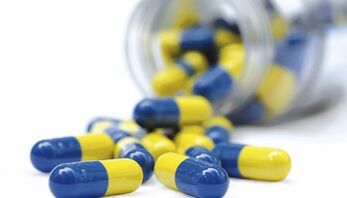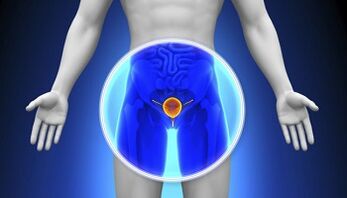
Prostatitis is an inflammatory or infectious urological disease that affects the prostate gland and can lead to not only impotence but also infertility.According to statistics, this disease occurs in 50% of men.It is also noteworthy that the disease is often diagnosed with young people (up to 40 years).The treatment of both acute and chronic forms of prostatitis is a fairly long process, but most often with conservative measures - prostatitis tablets, physiotherapy procedures are used and lifestyle adjustment.
It should be noted that an operation with such a disease is not excluded - if medication does not give the appropriate result or in a particular clinical case, it is not at all effective.In any case, the treatment program prescribes the treatment program separately.
Signals for use
Important!Even the presence of characteristic symptoms is not the reason for the pills to be taken from the prostate.The clinical picture may be the result of another urological or even vein disease.In addition, the symptoms can be a manifestation of prostate cancer, so taking some drugs will not only be effective but also dangerous.After the diagnosis, only men from prostatitis should be prescribed in men.
Prostate gland inflammation has mild symptoms at the initial stage.
The development of acute prostatitis may indicate such clinical symptoms:

- Painful feelings during intercourse or urination.It is noteworthy that pain can be present during erection and at the end of sexual intercourse;
- frequent, often discomfort, with urination;
- Pain in the pubic area often gives his feet and sacrum in the groin;
- The disease can be increased in acute form;
- Weakening of the erection, but total impotence does not occur;
- There is pain during ejaculation;
- Early ejaculation.
In the chronic form of prostatitis, the clinical picture is almost the same, but manifests itself in a wave.However, the symptoms are not as pronounced as in acute form.This pathological process is such a latent way that often leads to delayed diagnosis when the disease is impossible to cure.
To determine exactly what drugs will be most effective in men to treat prostatitis, the doctor only after making a comprehensive diagnosis.
If prostatitis is suspected, such laboratory and instrumental measures are taken:
- Blood fence for general and biochemical analysis;
- STD test;
- PCR testing;
- Urethral smear for bacteriological research;
- Transrectal ultrasound examination of the prostate;
- Ultrasound of the genitourinary system;
- Small pelvic organs CT or MRI.

Treatment of prostate inflammation is always individual.
Please note that this is just an approximate diagnostic program.The exact list of analyzes - both laboratory and instrumental - determines the physician separately, taking into account the results of physical examination and collected history.
Treatment
The basis for treatment, if there is no reference to surgery, taking medicines.It is impossible to answer the "which tablets are most effective from prostatitis" as the drugs are prescribed separately.Therefore, what was effective for one patient can be useless to the other.
Treatment of prostatitis with tablets means taking medications for the following effect:
- antibiotics;
- non -steroid anti -inflammation;
- painkillers;
- alpha blockers;
- immunomodulators;
- Plant -based tablets or homeopathic preparations.
The duration of the medication, the intake and the dosage system are also determined by the attending physician.
Above all, the doctor prescribes antibacterial therapy.
Antibiotics
To determine which antibiotics are suitable for the patient, bacteriological sowing was previously done.In most cases, treatment is done:
- tetracycline;
- penicillins;
- Fluoroquinols.
Antibiotics cannot be viewed in themselves, as the drugs of this pharmacological group can be extremely negatively influenced by the work of the body if they are badly taken.
Side effects include:
- allergic reactions;
- complications from the functioning of the kidneys, liver;
- noise in the ear, dizziness, headache;
- dermatitis;
- drowsiness, lethargy;
- Nausea and vomiting.
If side symptoms are detected, you should stop taking the tablet and consult a doctor.
Doctors have noticed that the pain and other symptoms of prostatitis will disappear even after taking antibiotics, even if the infectious nature of the disease has not been determined.
Patients prescribe antibacterial drugs to treat non -bacterial prostatitis.
Non -steroid anti -inflammatory
The drugs of this group are essential for the treatment of any form of prostatitis, as the inflammation is alleviated and at the same time unpleasant symptoms that this pathological process provokes - pain, burns, difficulty in the inginal region.
But they cannot be taken if there is a stomach ulcer, myasthenia.
Painkillers
In this case, the drug is used for symptomatic treatment.
The safe dose is also determined by the attending physician.You should not abuse such drugs as the body quickly gets used to them and does not give the appropriate therapeutic effect.
Analgesics allow people to live a full life.
Alpha-blockers
The drugs of this pharmacological group are used to improve urine outflow and are used for almost all forms of prostatitis.
It should be noted that in most cases these drugs are used for symptomatic treatment and not to eliminate the disease in the root of the disease.
In addition, plant -based homeopathic remedies are used.They are used in cases where no antibiotics are required.
Of course, no one can prohibit medicines without a doctor's prescription, as many are released in a prescription pharmacy.At the same time, you need to understand the following - taking your doctor without a prescription can be dangerous to health.Even if the symptoms disappear, the disease itself cannot be eliminated.And this means that chronization of the pathological process and the risk of developing concomitant complications are increased.
For the first symptoms, you should consult a doctor and do not treat treatment at your discretion.The doctor not only takes effective pills, but also prescribes physiotherapy and gives general recommendations.Only such a comprehensive approach to the treatment of prostatitis gives the desired therapeutic effect.
In addition, the prevention of such diseases should be prevented and regularly (once every six months) is a preventive examination of a urologist or andrologist.























